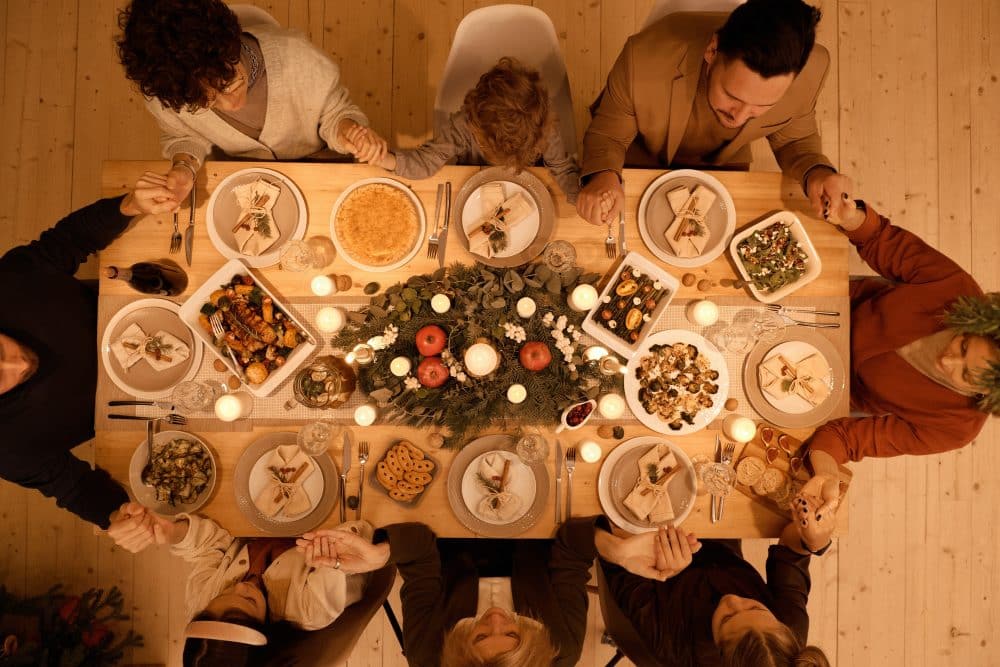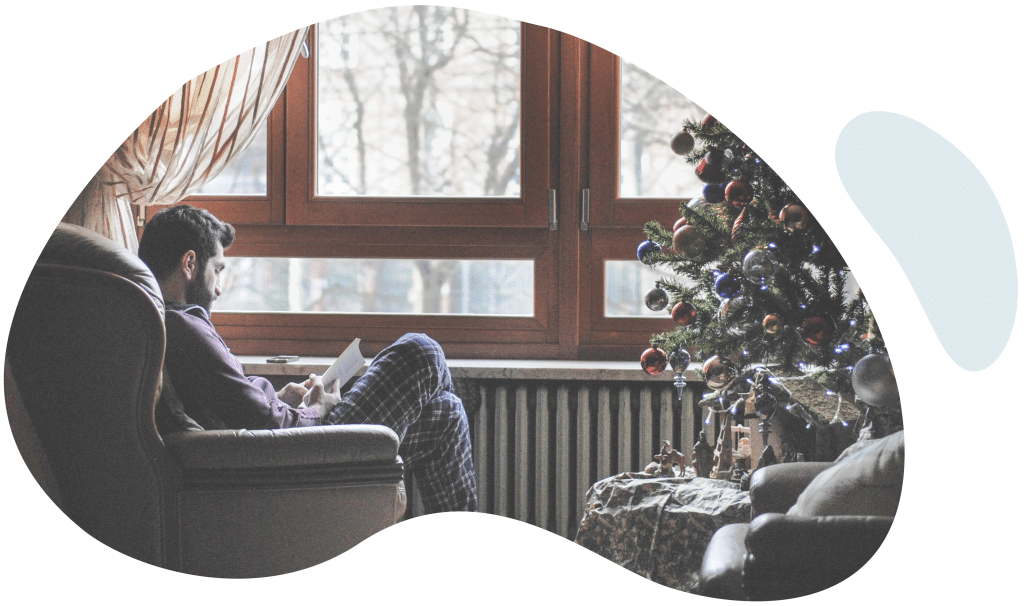Holiday Socializing Tips that Work for Your Attachment Style

Published on December 27, 2021 Updated on January 20, 2022
Socializing and festive gatherings are part and parcel of the holiday season. Whether they consist of only family members or include friends or acquaintances that you haven’t seen in a long time – many people anticipate Christmas and New Year’s Eve parties with a great deal of excitement. After all, they’re an excellent opportunity to let loose with loved ones after a long year. However, if you have an insecure attachment style, you may prefer to avoid these festive gatherings entirely. Alternatively, you might enjoy elements of them, but socializing tends to make you feel stressed and triggered.
Regardless, holiday parties may have protective benefits for our mental health and overall well-being; socializing helps sharpen our cognitive skills, increases happiness levels, and can even extend our lifespan. We are social creatures by nature and tend to function at our best when we’re a part of a community. For these reasons, socializing during the holidays is more than just an obligation. Instead, it can be an opportunity to improve your quality of life, and more importantly, have fun – even if you have an insecure attachment style.
In this blog post, we will go through ways in which you can manage festive socializing if you have one of the three insecure attachment styles:
If you don’t yet know your attachment style, then you can take our free quiz here and get your report straight away!
Holiday socializing tips for avoidant attachers
It’s not unusual for an avoidant attacher to have lots of acquaintances. However, these connections tend to be mostly surface-level. Therefore, if you are high in avoidant attachment, then your attachment traits are likely activated by people you haven’t seen in a long time attempting to be close to you, asking a lot of personal questions about your life, and being touchy-feely with you.
What’s more, your discomfort and keenness to extricate yourself from such circumstances may be evident to these people. It can thus lead to confrontations and thus increased stress and anxiety. Whereas people are expected to be jolly and happy over the holiday season, this doesn’t mean that you should place yourself in a situation in which you are uncomfortable.
However, there are several ways in which you could socialize successfully and not trigger your avoidant attachment traits:
1. Focus on what you like about Christmas and NYE parties

Think about the elements of festive gatherings that you enjoy. Whether it’s one particular person that you’re looking forward to seeing, getting dressed up, the cheesy Christmas tunes, or the finger foods – focusing on the positives about festive socializing may help reduce any pre-party apprehension that you may have.
2. Plan and create a conversation plan
Think about the people or family members you are likely to encounter at your upcoming gatherings. Write down a structured list of questions that you could ask them about their lives. Making such a list can stop people from probing too much into your personal life. It can also prevent you from seeming like you don’t want to be in others’ company. It will thus reduce the risk of hurting their feelings or causing an argument. What’s more, others will appreciate your attentiveness to what’s going on in their lives.
When making your conversation plan, start with more general questions. Build up to more specific ones as the conversation progresses. Also, ask open-ended questions and show genuine interest in the other person’s answers by actively listening. General, yet open-ended questions may sound like this:
- “How has your job been going? Are you enjoying it? What’s the best part about it?”
- “How long are you with your partner? How did you two meet?”
- “What was your favorite thing about last year? Why?”
Try to transition organically to more specific questions as the conversation progresses by tapping into the details of a piece of information. For example:
- “That class you’re taking seems fascinating. What made you want to get involved?”
- “I’m interested in seeing that film too. Do you like that genre in general?”
- “I love that you’re volunteering – how did you get started in it?”
Once your planned questions have run their course, you could use a pre-prepared excuse for ending the conversation naturally and potentially reuse the same strategy for other people at the gathering – but remember to tweak the questions for someone’s unique circumstances.

3. Reward yourself with some personal time
If you feel a little overwhelmed by so much socializing, you could reward yourself with some much desired alone time. Maybe watch a film that you love, or read a book that you enjoy – promising yourself that you can relax the day after a party may increase your motivation to attend.
Holiday socializing tips for anxious attachers
If you’re high in anxious attachment, then you might act hypervigilant towards other people’s actions at a holiday gathering – especially if you haven’t seen them in a while. You may end up monitoring their body language and facial expressions for signs of boredom, discomfort, or agitation. Doing so may end up creating high levels of stress for you as you may attempt to micromanage their emotions and mood.
Yet, we all experience a range of emotions and moods – especially over the holidays. And your friends and family are no exception. Whereas, as an anxious attacher, you likely want everyone to feel comfortable and at ease, for the most part, you cannot control other people’s emotions, and attempting to do so may cause you to feel anxious and stressed. It may be necessary to remind yourself that you tend to act as a sentinel towards threat – so you might be picking up on cues that don’t exist.
Before a holiday gathering or party, it may help for you to prompt yourself that other people’s moods typically have nothing to do with you. Their facial expressions and behaviors are probably associated more with their own feelings about socializing. The following actions might help you socialize successfully and not trigger your anxious attachment traits:
1. Engage in activities that make you feel like you
If you have an anxious attachment, then you may do whatever you can to impress other people in an attempt to make them like or approve of you. However, the risk of doing so is that you could potentially lose your sense of self. To avoid as much this year, do things that make you feel like the best version of yourself before attending a festive gathering. Perhaps you enjoy painting, listening to music, or watching a film that resonates with you. Tapping into such personal activities can remind you of your values and reduce the chance that you will try to adapt yourself to other people’s standards.
2. Practice detachment

Detachment means building and maintaining personal boundaries to prevent your attachment traits from becoming triggered. Doing so can dampen emotions, but for an anxious attacher, this can be a positive thing! Detachment can prevent you from becoming hypersensitive to potential cues from others during a festive gathering, which, in turn, can reduce levels of stress, anxiety, and disappointment when you feel that people are not enjoying your company.
However, voluntary detachment is very different from lacking emotions or not being able to be present at a party – instead, it is personally defining what to attune to and what not to.
When attempting to detach, it is important to remember to enjoy the emotional elements of the holiday gathering, but not so much that you try to control the outcome. If you find that you are starting to do so, try to bring the focus back to what you can actually control, such as questions you ask or people you talk to. This way, you can stay grounded in the moment rather than feeling like you’re spiraling. You might find that affirmations such as the following may help you feel grounded:
“I am doing the best that I can, with the resources that I have available to me.”
“I know that I tend to read into things too much. Other people’s reactions and expressions have nothing to do with me.”
“I am relaxed and able to handle this situation.”
Holiday socializing tips for disorganized attachers
Disorganized attachers tend to alternate between anxious and avoidant attachment traits. Thus, if you have this attachment style, you may both long for connection with the people at a gathering. But you might also be so afraid of rejection that you may be tempted to hide away from them or else come across as highly uncomfortable. Whereas it may be helpful to have a pre-prepared script for questions and to remind yourself that people’s moods probably have nothing to do with you, it may also be important to prompt yourself that holiday gatherings are infrequent.
Thus when it is over, nothing much in your life will have changed – whatever emotional distress you are experiencing as a result of a family gathering is temporary and unnecessary. You were strong enough to get through events such as this in the past, and this one will be no different. Taking actions such as the following may help you engage in socializing without triggering your disorganized attachment style:
1. Remind yourself that anticipation is usually worse than reality
Often, our fears about a holiday gathering (or any form of social gathering) are worse than the actual party itself. You could mentally prepare yourself for festivities by anticipating your fears in advance and making a note of them. Once you have done so, you can challenge them by examining the evidence to the contrary. For example, you might think something along the lines of:
“People won’t want to talk to me at the party. I’m not worth it.”
Instead of automatically accepting this type of thought as fact, try to think of times in the past where it was actively proven false. Was there a work party where someone clearly enjoyed your company? A time in school or university when you held an interesting or successful conversation? Be objective in your analysis – nobody lives in a vacuum, so you’re bound to find evidence to challenge your thought. Once you have done so, replace your existing thought with a new, more adaptive one, such as:
- “People have enjoyed my company in the past. There’s no reason why they won’t on this occasion.”
If you find your confidence wavering before the party, you could carry a “cheat sheet” of adaptive thoughts around with you so that you can remind yourself that you’re more than capable of handling the event when you need to.
Remember, seeing yourself in a positive light can result in a self-fulfilling prophecy – believing that you’re enjoyable to be around will result in you behaving in a way that actually is.

2. Start small
Don’t throw yourself into the social deep-end too quickly; expand your comfort zone little by little – by first taking steps that don’t daunt you too much. For example, if you know that you have an upcoming family gathering, you could arrange to meet up with a member that you’re close to (if you have any) first and arrive together. Alternatively, you could start the party by aligning yourself with the person that you’re most comfortable with and eventually branch out to others as you start to feel more comfortable. The same strategy works for parties with friend groups.
3. Protect your well-being
It doesn’t matter how important the party is, how much pressure you’re under to attend, or how angry people will be if you decide not to go. Use your best judgment to determine whether attending a certain gathering will be beneficial for you, or whether it could potentially be harmful to your well-being. Suppose you determine that the outcome could be the latter. In that case, it may be wise for you to make alternate plans that you will enjoy, such as arranging to meet up with a close friend or family member for dinner or a movie, or engaging in a self-care activity that you find soothing. No festive gathering is worth putting your mental health at risk for – especially if that event has the potential to re-traumatize or trigger the traits of your attachment style.

Conclusion
Socializing is healthy – especially during the holidays. However, it can often be easier said than done to do so, particularly if you have an insecure attachment style. Let us know whether you found any of the provided tips useful for your attachment style and why. We want to continue providing strategies that work for our readers, so your input matters.











 Get mental health tips straight to your inbox
Get mental health tips straight to your inbox








